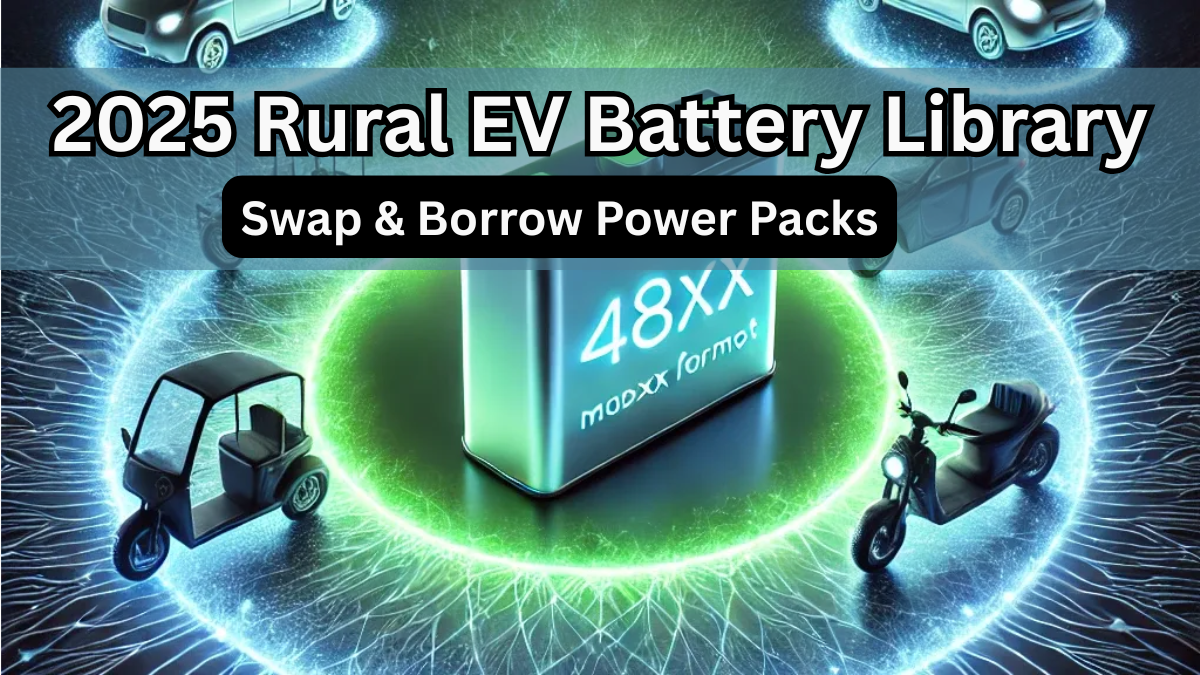With the push towards sustainable mobility, rural communities are increasingly adopting electric vehicles (EVs). One innovative solution gaining momentum is the Rural EV Battery Library, allowing residents to swap and borrow power packs conveniently. This model is transforming how EV users in remote areas access electricity without the hassle of home charging infrastructure.

What is a Rural EV Battery Library?
A Rural EV Battery Library is a centralized hub where electric vehicle owners can:
-
Borrow fully charged batteries for immediate use
-
Swap depleted batteries for charged ones
-
Return used batteries for recharging
This system addresses two critical challenges in rural EV adoption:
-
Lack of widespread charging infrastructure
-
High upfront costs for EV battery ownership
By providing a swap-and-borrow model, these libraries ensure EV owners stay on the move while promoting a sustainable, community-driven energy ecosystem.
How Rural EV Battery Libraries Work
The operation of a Rural EV Battery Library is simple yet effective:
| Step | Process |
|---|---|
| 1 | EV owner arrives at the battery library with a depleted battery |
| 2 | Staff verifies the battery and lends a fully charged pack |
| 3 | Depleted battery is recharged at the facility using solar or grid energy |
| 4 | EV owner continues their journey without delay |
This streamlined approach not only enhances mobility but also reduces range anxiety, a common concern among rural EV users.
Benefits of Rural EV Battery Libraries
Implementing these libraries brings multiple advantages:
-
Accessibility: EV owners in remote areas can charge their vehicles without long detours
-
Affordability: Reduces the cost burden of owning multiple high-capacity batteries
-
Sustainability: Encourages renewable energy integration, particularly solar-powered recharging stations
-
Community Empowerment: Creates local employment opportunities in battery management and maintenance
Additionally, this system complements broader EV charging solutions, ensuring rural areas are not left behind in the EV revolution.
Integration with EV Charging Solutions
While the battery library system provides immediate power swaps, integrating it with EV charging solutions enhances convenience:
-
Public charging stations in key rural hubs
-
Mobile charging vans for emergencies
-
Smart energy management to optimize battery usage
This hybrid approach ensures that even in regions with limited grid infrastructure, EV owners can rely on consistent, reliable energy sources.
Challenges and Considerations
While promising, the Rural EV Battery Library concept faces some challenges:
-
High initial setup costs for battery libraries
-
Maintenance of battery health and lifecycle management
-
Logistics of transporting and storing batteries safely
Addressing these issues requires collaboration between local governments, private companies, and community stakeholders.
FAQs
Q1: Who can use a Rural EV Battery Library?
Anyone owning an electric vehicle in the community can access the library. Membership or registration may be required depending on local policies.
Q2: How are the batteries maintained?
Batteries are checked regularly for performance and recharged using solar or grid electricity. Libraries often follow strict protocols to ensure safety and longevity.
Q3: Can these libraries be integrated with other EV charging solutions?
Yes, they complement public charging stations, mobile chargers, and community-based solar solutions, creating a robust charging ecosystem.
Q4: Are there cost benefits to using a battery library?
Absolutely. Users save on buying multiple batteries and avoid downtime, making EV usage more economical and efficient in rural areas.
Click here to learn more
